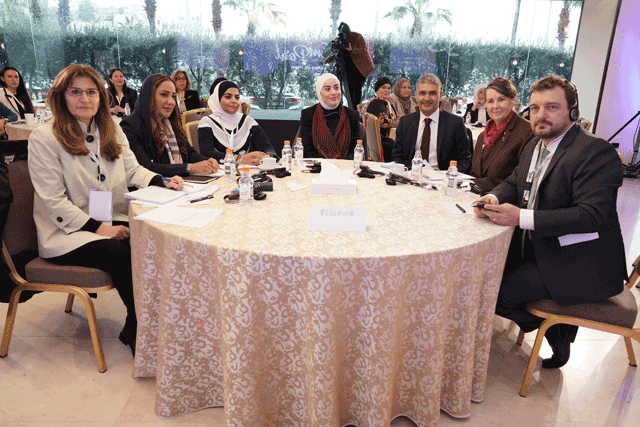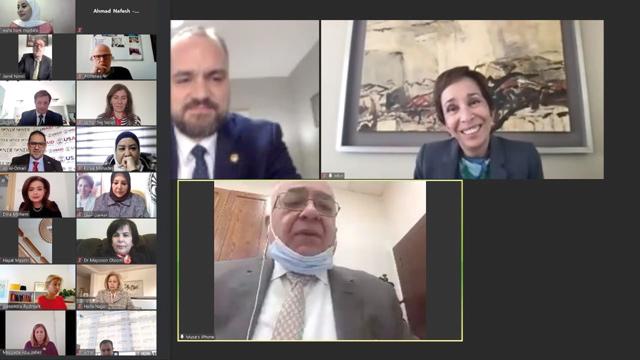You are here
Women ‘should not bear additional costs’ of online harassment, says Social Development minister
By Rana Husseini - Feb 07,2023 - Last updated at Feb 07,2023

Minister of Social Development Wafa Bani Mustafa and guests during the 2023 FemParl Middle East and North Africa conference in Amman on Tusday (Photo courtesy of organisers)
AMMAN — Women who work in public affairs in Jordan, as well as the region, should “fully enjoy a safe electronic space” to maintain their leadership positions in their respective countries, said Minister of Social Development Wafa Bani Mustafa on Tuesday.
“Women should not bear additional costs because of their participation in public affairs or political work,” especially as “society is aware of the importance of women’s role as partners in decision-making,” Bani Mustafa stressed.
The minister stressed the importance of the subject during her address at the two-day 2023 FemParl Middle East and North Africa conference, a Canadian-founded initiative which opened in Amman on Tuesday.
This year’s conference is focused on the challenges posed by various forms of online violence for women actively engaged in the public sphere, whether in politics, journalism or other fields, according to a statement distributed to the press by the Canadian embassy in Amman.
Continuing her remarks, Bani Mustafa urged women working in public life and those in decision making positions to address cyber bullying by “ignoring the violence, blocking abusive followers and filtering all comments”.
“The technological revolution caused major changes, both positive and negative, in the lives of individuals. This makes the majority of people vulnerable to exploitation and violations of our privacy, our lives and the lives of our families if we do not deal with it carefully,” Bani Mustafa told the gathering.
She stressed the need to deal with cyberbullying, noting that the issue affects both males and females. Precautionary measures must be taken to protect future generations from cybercrime, she said.
Canadian Ambassador to Jordan Tarik Ali Khan also addressed the gathering, where he noted that the FemParl initiative, launched in 2018, was born out of a desire to translate Canada’s commitment to gender equality and women’s empowerment into concrete action, as well as “our deep belief that women belong everywhere decisions are being made”.
“This year, the conversation will focus on the challenges posed by various forms of online violence for women who are actively engaged in the public sphere,” Khan said.
According to Khan, this particular theme was chosen because “we are seeing a growing number of women being exposed to such violence. Yet because the phenomenon is relatively new, our understanding of the problem and how to effectively tackle it is still nascent. We have work to do”.
Meanwhile, UN Women’s Country Representative in Jordan Nicolas Burniat said that online platforms are increasingly being used as vehicles to perpetrate acts of violence and abuse such as harassment, threats and others.
Due to the increased prevalence of online harassment, it is of “utmost importance” to raise awareness in this regard, and to provide more services regarding how to respond to such a challenge, find innovative solutions to address it, and prevent and limit this type of violence, Burniat maintained.
Canadian Senator Marilou McPhedran, also speaking during the event, pointed to a recent study that showed a 70 per cent increase in cyber-violence during the COVID-19 pandemic.
“Women, specifically human rights activists, were the most targeted, according to another study conducted in 2020, which constitutes a challenge for women to engage in public work,” McPhedran said.
Political Participation Advisor for UN Women’s Regional Office for the Arab States, Simone Briony Louise Oluoch-Olunya, who participated virtually in the event, highlighted findings from a recent study conducted by UN Women titled: “Violence Against Women in the Online Space: Insights from Multi-Country Research in the Arab States”.
Among female Internet users in Arab nations, the research found that 49 per cent “do not feel safe from online harassment”, Oluoch-Olunya said.
According to Oluoch-Olunya, 40 per cent of women who have experienced online violence do not report it, because “in their opinion, it does not make any difference”.
“The study showed that around one in five women (22 per cent) who experienced online violence either deleted or deactivated their accounts,” Oluoch-Olunya added.
Among women who experienced online violence in 2020, 44 per cent said that the incident moved offline, compared with 15 per cent of women who had experienced online violence at other points in time, Oluoch-Olunya added.
This year’s FemParl conference is the third held in the MENA region. Previous conferences took place in Beirut and Cairo (2019), and in Tunis (2020). Delegates to the Amman conference hailed from Algeria, Egypt, Iraq, Jordan, Kuwait, Lebanon, Morocco, Oman, Tunisia and the Palestinian Territories, according to the Canadian embassy statement.
According to the statement, the Internet has become a vital space for communication, information-sharing and connection, and an indispensable tool for engaging in political and public life.
At the same time, however, online platforms are increasingly used as vectors for perpetrating violence and abuse such as harassment, intimidation, disinformation, bullying, blackmail, defamation, stalking and threats. The safe use of the Internet is essential to women’s political empowerment, the statement added.
Related Articles
AMMAN — Confronting the phenomenon of sexual harassment in Jordan is a matter of high priority which needs to be addressed on a national lev
AMMAN — In the virtual world, a large and expanding platform, women are at higher risk of digital violence, said Minister of State for Legal
AMMAN — HRH Princess Basma on Tuesday said that fear of political violence is one of the biggest factors that often discourages women from a

















